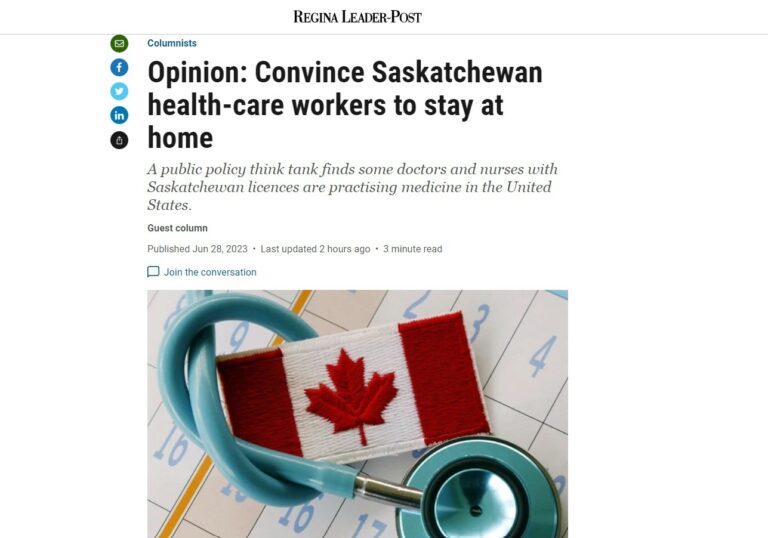REGINA LEADER-POST COLUMN – Convince Saskatchewan Health Care Workers to Stay at Home

What happens if you need a doctor or nurse and they’re not there? It could be a life-threatening delay. Or perhaps you have to wait an extra month or two with chronic pain while you wait for surgery.
Sadly, governments across Canada are reporting a shortage of doctors and nurses, including in Saskatchewan.
While the Moe government has started on a plan to attract more health-care workers to this province, and train more staff in the first place, another option deserves attention: convince more Saskatchewan nurses and doctors to stay here instead of leaving.
Most people in Saskatchewan probably know someone who has moved away to cities like Calgary and Edmonton for work, including health care workers. But what about further away?
SecondStreet.org recently collected data on the number of licences issued by states along the Canada/U.S. border to nurses and doctors with a Canadian mailing address.
This research builds on a previous SecondStreet.org report that discovered there are nearly 2,000 Ontario nurses who regularly commute to Michigan for work. It’s a very short drive from Windsor to Detroit, so this wasn’t particularly surprising.
However, the Michigan data also showed licences were issued to people with Saskatchewan mailing addresses as well as provinces like Alberta, B.C. and New Brunswick — too far for a commute.
After investigating the number of licences issued by all border states — not just for nurses, but for doctors, too — SecondStreet.org calculated they have licensed almost 10,000 doctors and nurses with a Canadian mailing address.
However, this doesn’t mean they’re all commuting — some have likely moved to the U.S. altogether or may be planning to work in the U.S. in the near future. Considering it costs US$450 to have your nursing credentials confirmed in the U.S., it seems unlikely they would get their licence on a whim.
SecondStreet.org found states along the Canada/U.S. border have issued licences to 179 nurses and 11 doctors with Saskatchewan licences. Interestingly enough, the majority of those (140) were issued by New York.
This figure would, of course, increase if you included states far beyond the border — including sunny destinations such as California, Texas and Florida to name a few.
The number would also rise if you included health-care workers who moved to the U.S. long ago and no longer have a Canadian mailing address — not to mention those who have moved to other parts of Canada.
So, how can health-care workers be convinced to stay in Saskatchewan?
When SecondStreet.org surveyed nurses in Ontario who work in Michigan, the top reason respondents noted they chose to work in the U.S was a lack of work in Canada; many noted there were only part-time jobs available in Canada.
Last year, the Leader-Post noted a survey that found 35 per cent of nurse practitioners were working part-time in Saskatchewan, but wanted full-time work.
Perhaps there’s a way the Saskatchewan government could offer more full-time work instead of nurses having to accept part-time work and constantly add more shifts to earn a full-time salary?
A second way Saskatchewan can retain workers is by continuing to partner with private clinics for surgery and other health services. The conversation often focuses on how these private clinics have reduced wait times.
But what’s not spoken about as much is how these facilities give more options to health-care staff. Perhaps these clinics could be more flexible and able to offer nurses and doctors what they’re looking for than bureaucratic, government-run hospitals?
Ultimately, more choice is better for patients and workers. If we don’t want our health-care workers to leave for places where the grass is greener, we need to water the lawn at home. Listening to feedback from nurses and offering more workplace options is the refresher the health-care system needs.
Dom Lucyk is the communications director with SecondStreet.org, a public policy think tank.
This column was published in the Regina Leader-Post and Saskatoon Star-Phoenix on June 28, 2023.
You can help us continue to research and tell stories about this issue by making a donation or sharing this content with your friends. Be sure to sign up for our updates too!


